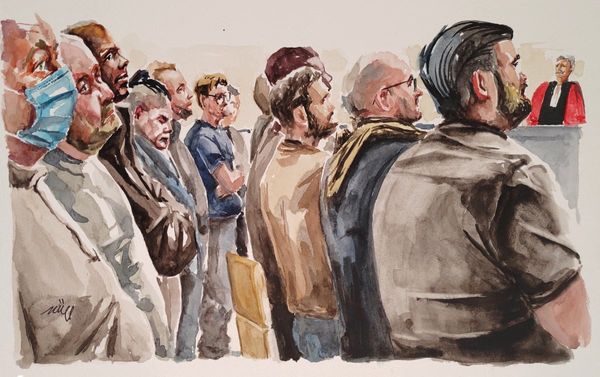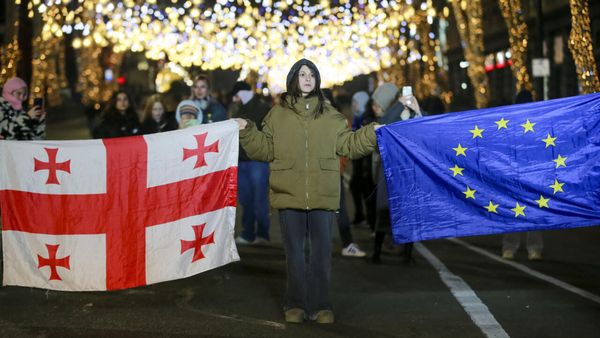
An internal UN report describes widespread abuse of Palestinian detainees in Israeli detention centres, including beatings, dog attacks, the prolonged use of stress positions and sexual assault.
The report was compiled by the UN Relief and Works Agency for Palestine Refugees (UNRWA) and is largely based on interviews of Palestinian detainees released at the Kerem Shalom crossing point since December, when UNRWA staff were present to provide humanitarian support.
The report, which has been circulated within the UN and seen by the Guardian, says that just over 1,000 detainees have been released since December. But it estimates that more than 4,000 men, women and children have been rounded up in Gaza since the start of the current conflict, triggered by Hamas raids into southern Israel on 7 October which killed about 1,200 Israelis, mostly civilians.
Israel denies the abuse allegations, which it described as Hamas-inspired propaganda. It has named 12 UNRWA staff it claims took part in the 7 October attack, and claims that 450 of the agency’s 13,000 workers in Gaza are members of Hamas or other militant groups.
The allegations, which are being studied by two separate UN inquiries, have so far not been substantiated. The UNRWA report says that its employees have been detained, many while carrying out aid work, subjected to abuse, and put under pressure to smear the agency.
Their Israeli jailers, it alleges, “through beatings and other mistreatment and threats, sought to elicit operational information and forced confessions”.
The UNRWA report said that among the 1,002 detainees released since December at the Kerem Shalom crossing, there were 29 children as young as six (26 boys and three girls), 80 women and 21 UNRWA staff. Some had chronic conditions such as Alzheimer’s or were cancer patients.
“Detainees reported being taken on trucks to large makeshift ‘military barracks’ housing 100-120 people each, where they were held, often for weeks at a time, in between periods of interrogation at a nearby location,” the UNRWA document said, in allegations first reported by the New York Times. It claims the worst abuse occurs in these detention and interrogation centres before the detainees are transferred to the Israeli prison system.
Legislation passed by the Knesset since the Gaza offensive began and extended for three months in January, allows the security services to hold detainees for 180 days without providing access to a lawyer.
The UNRWA report says: “Methods of ill-treatment reported included physical beatings, forced stress positions for extended periods of time, threats of harm to detainees and their families, attacks by dogs, insults to personal dignity and humiliation such as being made to act like animals or getting urinated on, use of loud music and noises, deprivation of water, food, sleep and toilets, denial of the right to practice their religion (to pray) and prolonged use of tightly locked handcuffs causing open wounds and friction injuries.
“The beatings included blunt force trauma to the head, shoulders, kidneys, neck, back and legs with metal bars and the butts of guns and boots, in some cases resulting in broken ribs, separated shoulders and lasting injuries,” the report alleges.
“While in an off-site location, several individuals reported being forced into cages and attacked by dogs, with some individuals including a child exhibiting dog bite wounds on release.”
The allegations in the report could not be independently verified but are consistent with accounts given to the Guardian, and collected by human rights organisations.
The report included allegations of widespread sexual assault, although not rape. Women detainees reported being groped while blindfolded, and some male prisoners said they were beaten in the genitals.
“Another detainee reported being made to sit on an electrical probe, causing burns to his anus, the scars for which could still be seen weeks later,” the UNRWA report said. “He indicated that another detainee had also suffered the same treatment and died as a result of his infected wounds.”
The Israel Defense Forces (IDF) issued a blanket denial of the allegations in the UNRWA report.
“The mistreatment of detainees during their time in detention or whilst under interrogation violates IDF values and contravenes IDF orders and is therefore absolutely prohibited,” a written statement provided to the Guardian said.
It added: “IDF denies general and unsubstantiated claims regarding sexual abuse of detainees in the IDF’s detention facilities. These claims are another cynical attempt to create a false equivalency with the systematic use of rape as a weapon of war by Hamas.”
The statement denied any use of sleep deprivation and claimed that music was only played “at a low volume in a specific place where the detainees are waiting for questioning (in a place where guards are also present), in order to prevent the detainees from talking to each other while waiting for the questioning”.
It said that “concrete complaints” of abuse in detention were “forwarded to the relevant authorities for review” but did not say if any complaints had so far been upheld. IDF officials refused to provide any further clarification.
The IDF said it was aware of deaths in detention and that each case was being investigated. “The investigations are pending, and as such we cannot comment on any findings,” the statement said.







